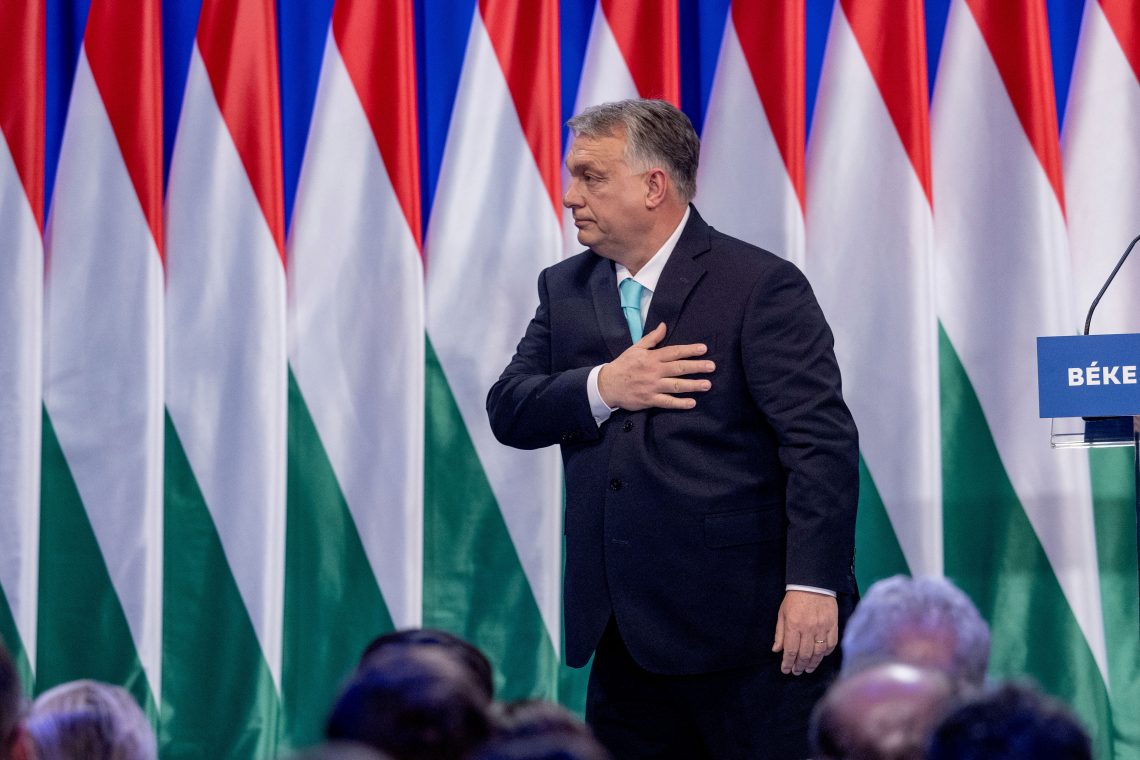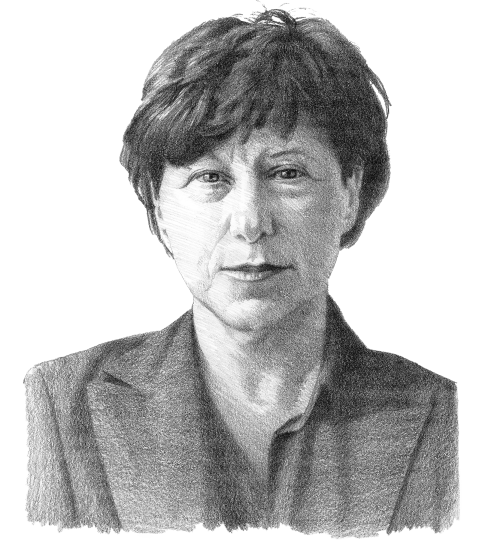Hungary on its own path
Hungary has not picked a side in the Ukraine conflict, but it may face mounting pressure to do so if the situation escalates.

In a nutshell
- Prime Minister Orban’s vision defines Hungarian foreign policy
- Budapest has condemned Russian aggression in Ukraine
- The West could pressure Hungary to cut ties with adversarial powers
Since the conservative Fidesz party won a parliamentary majority in 2010, foreign policy in Hungary has been the exclusive responsibility of Prime Minister Viktor Orban. He relies on a network of conservative think tanks to develop his strategy, including individuals such as historian Maria Schmidt, political scientist and economist Tamas Fricz, and in particular, lawyer and political scientist Balazs Orban (no relation to the prime minister), the prime minister’s political advisor.
Hungary’s assessment of the international situation
At the beginning of January, Balazs Orban, mentioned above, was tasked with informing the public about a speech given by the prime minister to a small audience at the end of 2022. It contained a comprehensive analysis of the current international situation and the broad guidelines for Hungary’s future foreign policy.
According to the vision laid out in the speech, Prime Minister Orban sees a fragmented world order, and the contours of a new one emerging. The “neoliberal” model is losing its effectiveness. The United States, as the leading world power, has now gained powerful rivals, especially China, whose rise was made possible precisely by the neoliberal model of the West.
This view holds that the Russian-Ukrainian war has proven that the Western-dominated world order is a thing of the past. In response, the West – led by the U.S. – has begun a new cold war. The Western bloc has regrouped to face the challengers of the U.S. This is very bad news for the European Union and especially for the countries on its periphery because it entails that all relations, including economic ones, are to be determined by the central power of the bloc, that is, Washington.
What are the consequences of this assessment for Hungary? Budapest’s ambition is to become a middle power in Central Europe. Therefore, it is particularly important that Hungary does not become part of the Western bloc, because then it would be condemned to the role of a subordinate peripheral state.
It is therefore in Hungary’s interest not to follow the economic and political “decoupling” pursued by the Americans and the EU. The country must therefore forge as many links as possible with other countries and market participants in the areas of trade, infrastructure and investment, including public diplomatic relations.
Criticism comes from the opposition
Unsurprisingly, the strategic orientation of Hungarian foreign policy presented here has been criticized by the left-wing socialist and green parties.
The leading force within the opposition is the Democratic Coalition (DK) led by former Socialist Prime Minister Ferenc Gyurcsany. Its spokesman, Gergely Arato, warned against a decoupling of Hungary from the West after Prime Minister Orban’s concept became publicly known. His critics argue that he wants to turn to the East only because corruption and authoritarianism are not tolerated in the West.
The often-heard argument that close Hungarian-Russian relations are a betrayal of the West is rejected by Budapest. Hungary remains a member of NATO and the EU, even though it does not shy from criticizing those organizations and defending its national interests.
Hungary’s close economic ties with Russia did not emerge during the Orban-Fidesz governments, but under the socialist governments of ex-communists Peter Medgyessy and Ferenc Gyurcsany, between 2002 and 2010. The volume of trade with Russia peaked in 2008 under Prime Minister Gyurcsany and has never reached that level again.
When Prime Minister Orban came to power in 2010, he embedded relations with Russia into a broader concept of international cooperation and “opening to the East.” To date, he has met Mr. Putin 11 times, seven times in Moscow and four times in Budapest. He also promoted high-profile relation-building with China, Turkey, and the Central and East Asian countries. In parallel, Hungary continued to participate in American military missions abroad, pursuing military cooperation.
Hungary in the Ukraine War
Hungary has condemned Russia’s attack on Ukraine as aggression contrary to international law and maintains this position. Prime Minister Orban repeatedly stated that “this is aggression.” Despite the negative consequences of the sanctions for Europe, Budapest has so far supported them all. However, some derogations have been granted by the EU to Hungary because of its geographical location and special economic structure.
Among the constants of the Hungarian position are two other considerations: one is the geopolitical positioning presented above, that is, the desire not to belong to any bloc. The other stems from the Fidesz government’s self-definition: it sees its most important task in international politics as representing Hungarian interests and preserving the country’s sovereignty. The war is not in Hungary’s interest, and Budapest will do everything not to be drawn into it.

“People often ask me whose side we’re on. We are on Hungary’s side,” Mr. Orban said at an international press conference in Budapest on December 21, 2022. He added: “Hungary does not want to be forced to take its steps against its own interest. So, I am not prepared to help the Ukrainians in such a way that I ruin Hungary.”
Hungary has been hit particularly hard by the EU sanctions against Russia. As a landlocked country, it cannot offset Russian energy supplies through ports. Hungary needs the war to end as soon as possible. Prime Minister Orban has called for an immediate cease-fire and direct talks between Russia and the U.S., which he considers to be the real adversaries. “Anyone who thinks that this war can be ended through negotiations between Ukraine and Russia is not living in this world because the real balance of power is different.”
Scenarios
Prime Minister Orban’s assessments of the course of the war and his own positions are becoming increasingly pessimistic. During an international press briefing on January 23, 2023, he said, “we are in big, big trouble” in the West. Because Russia failed to win a quick victory and install a Russia-friendly regime, the Kremlin’s goal now is to turn Ukraine into an ungovernable wreck. If Russia continues, NATO members could be faced with the question of whether to send soldiers to Ukraine.
It is safe to say that Hungary will not fulfill such an obligation. In addition to the geopolitical considerations, the situation of the approximately 150,000 ethnic Hungarians in the Ukrainian Carpathian foothills also speaks against it. Budapest wants to avoid further endangering the Hungarian minority at all costs.
Should the EU intervene in Ukraine with more offensive weapons or even with soldiers, relations between Hungary and the EU will become even tenser. In such circumstances, Hungary would have a hard time staying out of the war and preventing new sanctions. The means of veto can only be used in exceptional cases. The so-called Visegrad 4 (which aside from Hungary includes Poland, the Czech Republic and Slovakia) agreed on the migration issue during the 2015 crisis. However, these days, the other three Visegrad 4 countries, under the leadership of Poland, are closely aligned with the West regarding the war in Ukraine.
The tightening of the sanctions regime by the U.S. and the EU is now endangering Hungary’s internal peace. The still generous social benefits, made possible by the above-average economic growth of the last five years, will not be sustainable for much longer. To compensate for the energy price inflation caused by the sanctions, the state subsidizes basic consumption from the money it receives in the form of special taxes from large corporations, which cannot be a permanent course of action. Public debt is rising, and inflation is one of the highest in the EU. At the end of January, Hungary’s credit rating at S&P was downgraded to BBB-, only one grade above junk status.
Most Hungarians support Prime Minister Orban’s policy of neutrality and reject the sanctions. But the abrupt end of the increase in personal prosperity will nevertheless lead to internal tensions in the government before long.








